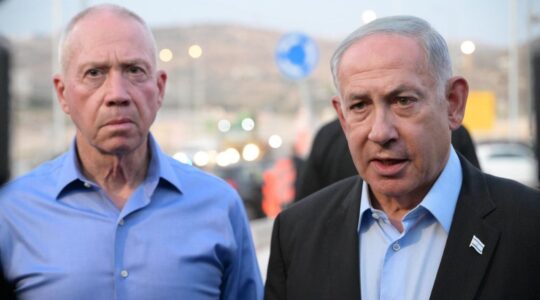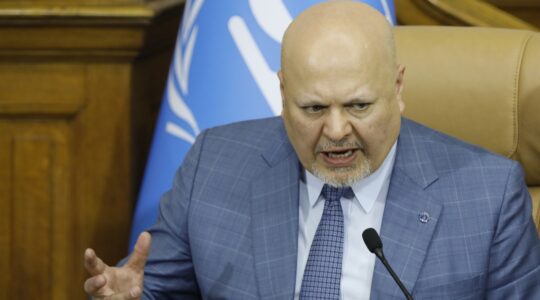JERUSALEM (JTA) — Like most of the international community, Israel is adopting a wait-and-see attitude toward the Mecca agreement between the Palestinians’ rival factions Hamas and Fatah.
Some Israeli analysts see the deal, reached Feb. 8 under Saudi auspices in the Muslim holy city of Mecca, primarily as an internal Palestinian affair enabling the rival militias to take a step back from the brink and stop weeks of armed clashes from escalating into a full-scale civil war.
Others, however, believe the Hamas-Fatah unity government called for in the agreement will be able to negotiate meaningfully with Israel on a two-state solution.
Much will depend on the new government’s attitude toward the international community’s conditions for dialogue: recognizing Israel, accepting previous Israeli-Palestinian agreements and renouncing terror. The Mecca agreement is vague on all three.
There are deep differences among Israeli pundits over which side made more significant concessions in the deal, and over whether the more moderate Fatah or the more extreme Hamas will be calling the shots in its aftermath.
If it is Hamas — as most Israeli pundits predict — there’s a further question: Will the terrorist group merely present a facade of unity in an effort to get international economic sanctions lifted without making any ideological concessions, or will it use the unity government as a cover to genuinely moderate its rejectionist positions?
The first significant test of the Mecca agreement could come early next week when Israeli Prime Minister Ehud Olmert, Palestinian Authority President Mahmoud Abbas of Fatah and U.S. Secretary of State Condoleezza Rice hold a summit to set the parameters for Israeli-Palestinian peace talks.
The Mecca agreement calls for an end to internecine violence between Hamas and Fatah, and the establishment of a national unity government led by Hamas in which Fatah would have parity. It does not call for recognizing Israel or renouncing terror. As for previous Israeli-Palestinian agreements, it does not call on the new government to endorse them, merely to “honor” them.
Some Palestinian moderates argue that “honoring” previous agreements implies recognizing Israel and renouncing terror, but Israel does not accept this logic — and so far, neither does the international community. Both continue to insist on direct, unambiguous and public acceptance of the three benchmark conditions.
The Mecca agreement also left some internal Palestinian problems unsolved. For example, it does not clarify the identity of the future interior minister, which for months has been a major bone of contention between Hamas and Fatah.
In the Palestinian system, the interior minister is in charge of all security forces except those under the president’s direct control, and where the minister’s loyalties lie is crucial. Prime Minister Ismail Haniyeh of Hamas, who is slated to lead the unity government, has the authority to put forward nominees for the post, but the sensitive appointment needs Abbas’s approval, and the two men have not been able to agree on a suitable candidate.
Moreover, it’s not clear what will happen to the outgoing Hamas government’s security forces. Will they remain separate and loyal to Hamas, or be integrated as part of a single Palestinian national security force under the interior minister’s control?
Israel’s military intelligence and the Shin Bet security service remain unimpressed by the Mecca agreement. Intelligence chief Maj.-Gen. Amos Yadlin told the Cabinet on Feb. 11 that it was still not certain that a unity government would be formed because of all the unresolved issues. Yadlin sees Hamas as the big winner at Mecca and says its Damascus-based chief, Khaled Meshaal, has emerged as a political leader on a par with Abbas.
According to Yadlin, Hamas will continue to control the P.A. government without moderating its ideology. It will go on building its military power for a future showdown with Israel or with Fatah while seeking international legitimacy through its ostensible partnership with Abbas.
The Shin Bet concurs: It says Hamas has won a timeout to build up its military power and improve its public standing.
Some Israeli pundits went further. Writing in Yediot Achronot, columnist Nahum Barnea accused Abbas of selling out Israeli and American interests. According to Barnea, in his eagerness to prevent further Palestinian bloodshed, Abbas gave in to Hamas on most points, and in doing so compromised the chances for an Israeli-Palestinian accommodation and for the emergence of a moderate pro-American front to contain Iran.
“The American administration thought it could develop a Sunni coalition from North Africa to Lebanon that would stand up to Iran’s Shi’ite megalomania,” Barnea wrote. “The Mecca agreement forces the Americans to think again.”
But other pundits discerned Hamas moving toward Fatah. Ehud Ya’ari, Channel 2’s Arab affairs analyst, observed that Meshaal had been talking about a “new diplomacy.” Ya’ari interpreted that as meaning that Hamas as an organization will continue its rejectionism, but will allow the new government to make genuine moves toward a two-state solution with Israel and give Abbas a free hand to conduct them.
Zvi Barel, Arab affairs analyst for Ha’aretz, argued that Hamas’ pledge to “honor” previous Israeli-Palestinian agreements constituted a historic concession. It “means agreeing in principle to the establishment of two states, which corresponds to the declarations made by Hamas leaders about aspiring to establish a state within the 1967 borders,” he wrote.
Israel’s official position is that the onus of proof will be on any new Palestinian government. Though skeptical, Olmert did not want to offend moderate Arab states, especially the Saudis, by rejecting the agreement out of hand.
One of the new government’s first tests will be whether it releases a kidnapped Israeli soldier, Cpl. Gilad Shalit, who has been held in Gaza since June. Another test will be whether the P.A. government puts a complete stop to rocket fire on Israeli settlements near Gaza.
The diplomatic “Quartet” managing the Israeli-Palestinian peace process, comprising the United States, European Union, United Nations and Russia, is taking a similar position, insisting that the new government meet the three benchmark conditions before sanctions on direct aid to the Palestinian Authority is lifted. Whether it maintains that position when the highly respected Salam Fayyad takes over the P.A. Finance Ministry remains to be seen.
However it plays out, the Mecca agreement has changed the Israeli-Palestinian equation. Time will tell whether it was a historic turning point or simply a lull before the next storm.

Help ensure Jewish news remains accessible to all. Your donation to the Jewish Telegraphic Agency powers the trusted journalism that has connected Jewish communities worldwide for more than 100 years. With your help, JTA can continue to deliver vital news and insights. Donate today.





